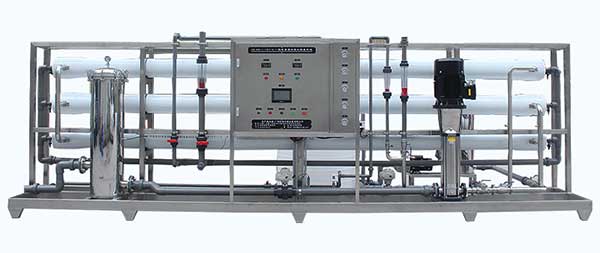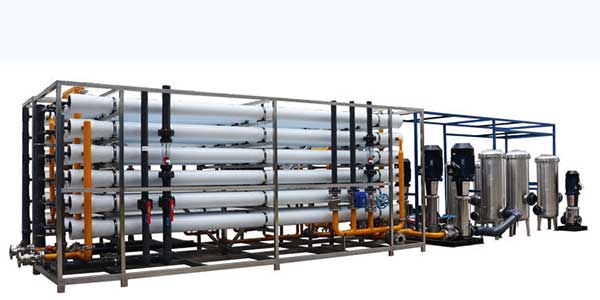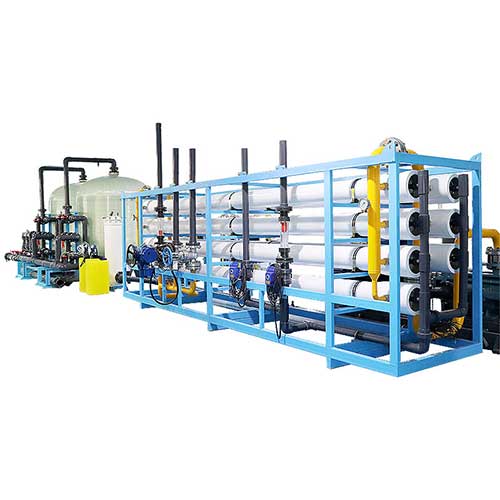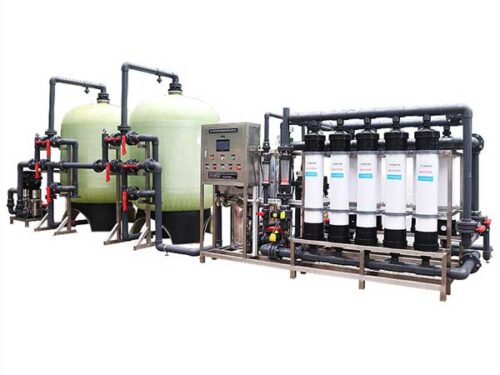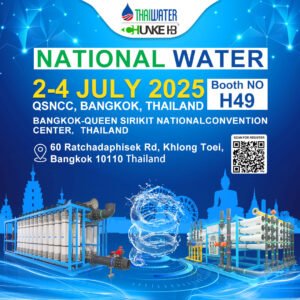Industrial water treatment is a kind of filtration process. So, industry uses it for a variety of applications with both simple and complex, effective, low-cost, and compact systems to handle various water purification and separation needs.
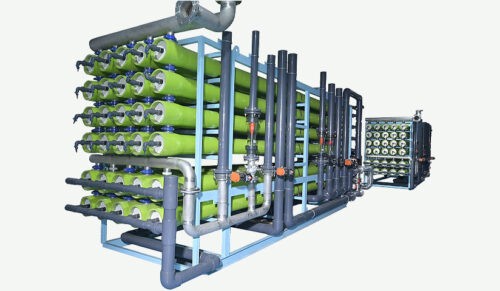
Why we need industrial water treatment systems? Because we need clean and safe water for drinking or for our production. So, we remove unwanted substances which have a negative effect on product quality. And if water is used in production processes, impurities can directly affect product quality.
Due to industrial water treatment consisting of numerous technologies, this article centers on providing a concise outline of the systems primarily used and encapsulate how they operate to gain greater insight on the most suitable solutions for your facility accordingly.
What is an Industrial Water Treatment?
Managing water treatment on an industrial scale involves a series of processes. While not all water chemistries will require each process, it is important to be aware of your options. So, the goal is to minimize risk at each stage of any water-based industrial process. Common industrial water treatment methods are:
- Filtration
- Softening
- Dealkalization
- Reverse osmosis
- Nanofiltration
- Ion exchange
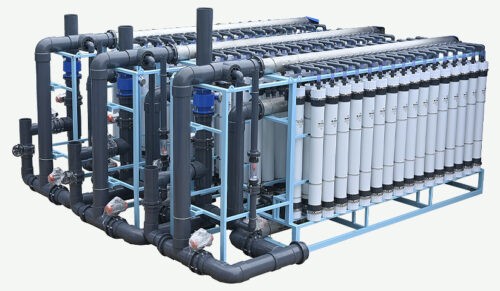
Filtration works to remove sediment, organic material, and turbidity. Softening removes hardness found in water. From here, dealkalization reduces alkalinity to minimize scale buildup downstream. While it may be sufficient for some applications, this process is often considering an antiquated solution due to the high operational costs and lack of universal effectiveness.
Hence, two optional treatments that may provide you with the right degree of industrial water treatment include nanofiltration and reverse osmosis. Meanwhile, nanofiltration allows for the removal of bacteria and hardness, whereas reverse osmosis will go one step further and reject a significant percentage of the total dissolved solids.
Ion exchange is a chemical process where certain (unwanted) ions are exchanged for others, resulting in a new, more suitable water chemistry.
What chemicals are used in industrial water treatment?
Examples of these chemicals include hydrochloric acid, hydrated lime, sulfuric acid, and sodium hydroxide accordingly. Other common treatment chemicals are coagulants and flocculants. So, these are chemicals that help make contaminants in wastewater stick together, so they will be easier to remove from water.
What are the 7 methods of industrial water treatment?
These include:
- Collection,
- Screening and Straining,
- Chemical Addition,
- Coagulation and Flocculation,
- Sedimentation and Clarification,
- Filtration,
- Disinfection,
- Storage,
- Distribution.
How do you purify water industrially?
Water treatment methods commonly used in commercial water purification systems consist of:
- Softening.
- Dealkalization.
Demineralization / Deionization. - Reverse Osmosis.
- Microfiltration.
- Multimedia Filtration.
- Nanofiltration.
- Ultrafiltration.
Benefits or Advantages of Industrial Water Treatment
Most industries are required by law to treat their wastewaters. As a result, this means that before these waters reach the rivers and other surrounding areas, it is already usable and safe for humans. Alternately, industries can reuse this treated water and conserve both money and water resources.
Here are the benefits that come with treating industrial water wastes:
1. Provides Reusable Water:
Immediately discarding wastewater into the environment can cause illness and harm to humans, animals, and plants. So, ti can also be harmful to the soil, water systems, and the atmosphere. However, treatment of these wastewaters can help provide water that’s safe for human use. It can even be used by the industry to minimize their overall water consumption as this water resource is reusable. This water conservation step is, therefore, beneficial for everyone accordingly.
2. Preserve the Environment:
Hence, waste from industries come with plenty of chemicals, which can be harmful and even fatal to living organisms accordingly. With industrial water treatment, these harmful chemicals are filtered and removed from the water. Not only will it be safe for human consumption, it is also safe for use in plants and the environment.
3. Prevents Diseases:
Dirty water can be a major source of illnesses. If industries accidentally release wastewater into the environment, it can certainly be a source of a host of diseases, which can significantly affect all living organisms.
4. Supports the Economy:
A lot of money is spent in addressing and preventing pollution. Imagine how much money the government will need to spend if wastewater could directly flow into the rivers. Because of its harm to the environment, animals, plants, and people will get sick. So, the government will also need money for cleaning up everything that wastewater has contaminated. But when industries treat their wastewaters, this disadvantage is eliminated.
5. Provides a Source of Energy:
Because water can be used to produce electricity, treating wastewater can help provide a renewable source of energy. So, an industrial water treatment plant can even be designed to run using this power source. Otherwise, this clean water can be used for other processes.
The main objective of industrial water treatment
The main objective of industrial water treatment is to prevent corrosion, scaling, and biological growth and to ensure that water disposal standards are met. Without the removal of the harmful mineral salts and corrosive gases, the industrial process equipment infrastructure such as the piping, cooling towers, and boilers systems would all suffer from the potential of corrosion, scaling, and ultimate system failure.
A catastrophic system failure can occur when industrial water treatment processes become out of balance and critical components are exposed to harmful corrosive scaling conditions. Hence, critical functions such as steam production are often shut down due to scaling or corrosion that attacks boiler tube efficiency.
Reverse Osmosis
An industrial water treatment system typically uses several processes in series or parallel to meet the specified water quality for the industrial process, steam generation, or incorporation into a food or beverage. Several processes are commonly utilized within the industrial water purification industry. RO Membrane filtration (reverse osmosis), (water filtering) will often be followed by deaeration, degasification, or decarbonation followed by additional ion exchange treatment. For disinfection, chemical treatment, ozonation, and or U.V. ultraviolet are all utilized accordingly.
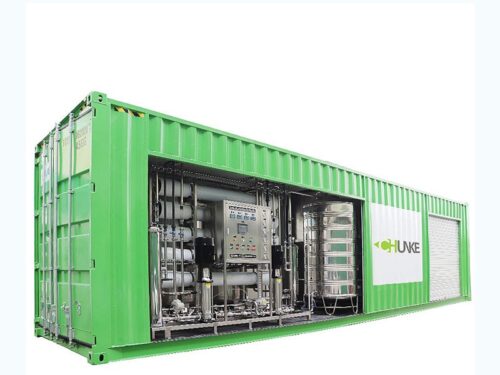
Which water Source can be used in Industrial Water Treatment?
Tap Water, Underground Water, Seawater, River Water, Deepwell Water, Borehole Water, Lake Water, Ocean Water and industrial Wastewater can be used as source for industrial water filtration accordingly.
Chunke Industrial Water Treatment System Solutions
Capacity Range: 72m3 to 7500m3/Day
Membrane Diameter: 8″
Working Pressure: 150 to 250psi
Feed Water TDS: 0-2000ppm
Capacity Range: 72m3 to 7500m3/Day
Membrane Diameter: 8″
Working Pressure: 150 to 450psi
Feed Water TDS: >2000ppm
Capacity Range: 38m3 to 2500m3/Day
Membrane Diameter: 8″
Working Pressure: 1200psi
Feed Water TDS: 20000 to 40000ppm
Capacity Range: 6m3 to 4000m3/Day
Turbidity: <300ppm
Total Suspended Solids: <100ppm
Control System: Manuel or Automatic
Industrial Water Treatment Systems Manufacturer in China
Guangzhou Chunke Environmental Technology Co. Ltd. is manufacturer of industrial water treatment systems. We have Industrial Reverse Osmosis Systems, Industrial Ultrafiltration Systems, Industrial Electrodeionization Systems (EDI), Industrial Seawater Desalination Systems (SWRO), Industrial Brackish Water Desalination Systems (BWRO), Industrial Water Filtration Systems (Meachanical Multi-Media Filters, Quartz Sand Filters, Activated Carbon Filters, Water Softeners) accordingly.

